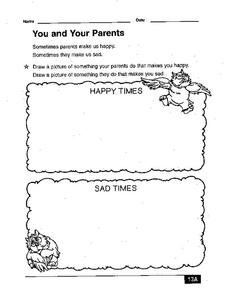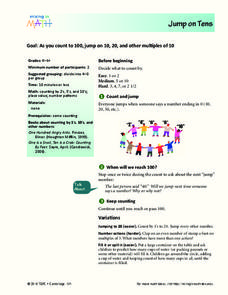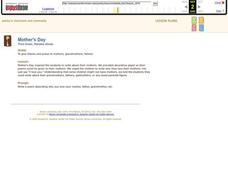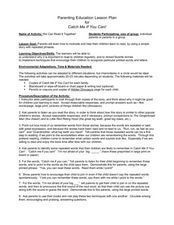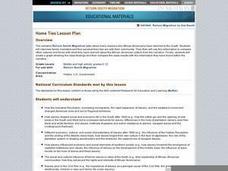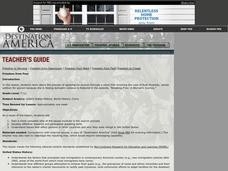Curated OER
A death in the Royal Family: Dealing with Loss
Students read and discuss the story "Prince Talks About Magical Grandmother." They list ceremonies of traditions associated with emotional times in their lives. Students prepare a script for a video message to Prince Charles designed to...
Curated OER
You and Your Parents
In this parent/child worksheet, young scholars think about things their parents do that make them feel happy or sad. Students draw pictures to illustrate happy and sad times.
Civil War Trust
Genealogy
The Civil War is undoubtedly a part of America's history, but could it be part of your pupils' history as well? Middle schoolers conduct research to discover a connection between their ancestors and the American Civil War. Whether...
Peace Corps
Community
What is a community? Find out with a lesson that sheds light onto the different types of communities—school, local, and global. Scholars read informational text detailing the life of a young girl from Cape Verde and take part in a...
Teaching Tolerance
Community Spotlight Cards
Not all heroes wear capes—or cleats. Class members identify unsung heroes in their schools or towns for interviews, then create trading cards. A celebration including presentations or trading of cards completes their investigation of...
Novelinks
The Good Earth: Concept Analysis
Designed for teachers, this resource provides an overview of Pearl S. Buck's Pulitzer Prize winning novel, The Good Earth. Information about the organizational pattern of the story, issues and themes addressed, historical background on...
US Institute of Peace
Defining Conflict
Conflict is everywhere—but is it avoidable? The first activity in a series of 15 peacebuilding lessons examines the nature of conflict at home, school, and across the world. Learners develop a definition of conflict through group work...
Curated OER
The House That Drugs Built
Students evaluate the long and short term effects of substance abuse on the individual, family, and society. The instructional activity includes numerous instructional and learning strategies such as role-playing, discussion, research,...
Curated OER
Jump on Tens
Give the actors in your class a chance to shine as they act out skip-counting. In their roles, they take turns shouting out different number patterns and jumping when reaching the given goals set for each number family. A fun and...
Curated OER
Aborted Funds
Students examine the basic structure of the United Nations Population Fund. They assume the roles of various parties involved in the United States' funding of the Population Fund to gain an understanding of the current administration
Curated OER
History & Diversity
Learners list the qualities needed to build strong family relationships. They gain an appreciation for the sacrifices of their ancestors who came to America and gain insights into the many fine qualities of minority families.
Curated OER
The Modern Day Minstrel - Lesson 1
Learners identify and describe the various roles that musicians fulfill. They recognize various genres of music. They identify and interview musicians in the community and invite them to come in and talk about their roles as musicians.
Curated OER
Mother's Day
Third graders write a poem describing why they love a special family member. They use decorative paper and illustrations for their poems. Students give thanks and praise to their family members.
Curated OER
Who Went Where?-- Full Color Copy
In this reading comprehension worksheet, students create a small book by stapling together 10 fully illustrated pages. The story depicts family members going places: for a hike, a swim, a ride. It ends with a family group going for a...
Curated OER
Big Apple, Here We Come
Young scholars role play the role of immigrants coming to America for the first time. They complete an imaginary trip with their family and must rent a car and make seven stops along the way. They calculate distances and use maps to...
Curated OER
We Can Read It Together!
Students practice various skills in order to help children to learn the skill of reading. The lesson emphasizes the importance of reading to young children on a regular basis. The skills of repetition of key words and phrases are...
Curated OER
Health/Wellness
Learners role-play the role of an employee of the Center for Disease Control. In groups, they identify and discuss the functions of the major body systems and analyze their family tree. They watch a video about plagues and calculate...
Curated OER
Home Ties Lesson Plan
Students interview family members to find out what their ties are with the community. They use this information to compare other cultures and times with what they have learned about the African-American culture. They create a Venn diagram.
Curated OER
Freedom to Worship
Students investigate reasons why people sought freedom to worship in the United States and some of the difficulties and issues facing them in their immigration. As immigrants, they write letters to family members in the old country.
Curated OER
Total War
Students view a video about the result of using atomic weapons during World War II. They examine how human rights are violated during wartime. They listen as family members come and speak to the class about their experiences during the...
Curated OER
Sleepy Time
pupils collect and interpret data about their own sleep patterns, as well as family members. Students graph their results and compare with others in the class. Pupils identify and interpret healthy sleep patterns and behaviors.
Curated OER
Personal Timeline
Pupils interview family members, find seven important life events, and arrange these events in chronological order using the educational computer-based program Timeliner. This lesson includes a Timeliner example of student work.
Curated OER
Oral History: Interviewing Elders
Sixth graders examine oral history traditions. They interview family members about their childhoods and compare them to their own. Students use the collected information to make posters, letters, essays, or poems about their research.
Curated OER
Depression
Students work together to develop a survey to ask people who lived during the Great Depression. Using the information from the survey, they write an essay or a poem describing why it was bad for one of their family members to lose their...



